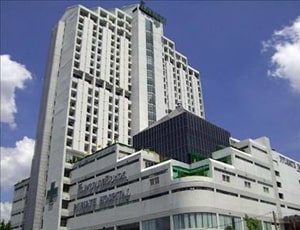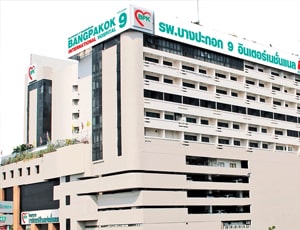The average cost of Hemodialysis in Bangkok approximately starts from USD 270
Treatment cost

Types of Hemodialysis in Piyavate Hospital and its associated cost
| Treatment Option | Approximate Cost Range (USD) | Approximate Cost Range (THB) |
|---|---|---|
| Hemodialysis (Overall) | 114 - 506 | 4057 - 17839 |
| In-Center Hemodialysis | 113 - 228 | 4009 - 7965 |
| Home Hemodialysis | 230 - 397 | 8038 - 13835 |
| Nocturnal Hemodialysis | 276 - 508 | 10239 - 18051 |


Types of Hemodialysis in Bangpakok 9 International Hospital and its associated cost
| Treatment Option | Approximate Cost Range (USD) | Approximate Cost Range (THB) |
|---|---|---|
| Hemodialysis (Overall) | 111 - 515 | 4096 - 18227 |
| In-Center Hemodialysis | 112 - 222 | 4070 - 7986 |
| Home Hemodialysis | 220 - 397 | 8153 - 13936 |
| Nocturnal Hemodialysis | 286 - 513 | 9849 - 18178 |
Hemodialysis is a blood-cleaning treatment that involves the use of a dialysis machine and a specific filter known as an artificial kidney, or dialyzer. The doctor must gain access to your blood vessels in order to get your blood into the dialyzer. This is accomplished with minimal surgery, which is commonly performed on your arm.
During treatments, you sit or recline in a chair while your blood flows through a dialyzer, which is a filter that cleans your blood like an artificial kidney. The procedure involves following stages:
Preparation: Your blood pressure, pulse, and temperature are all measured. The skin around your access site, which is the spot where blood leaves your body and then returns during treatment, is cleansed.
Starting: Two needles are placed via the access site into your arm and taped in place to keep them secure during hemodialysis. The needles are connected to a dialyzer by a flexible plastic tubing. The dialyzer filters a few ounces of blood at a time through one tube, allowing wastes and excess fluids to pass from your blood into dialysate, a cleansing fluid. Through the second tube, filtered blood is returned to your body.
Symptoms: As excess fluid is removed from your body, you may experience nausea and abdominal pains — especially if you only get hemodialysis three times a week rather than more frequently. If you're having trouble with the procedure, talk to your doctor about how to reduce side effects by changing the speed of your hemodialysis, your medication, or your hemodialysis fluids.
Monitoring: Because your blood pressure and heart rate may fluctuate as extra fluid is drained from your body, your blood pressure and heart rate will be measured multiple times throughout each treatment.
Finishing: The needles are withdrawn from your access site when hemodialysis is completed, and a pressure dressing is put to prevent bleeding. It's possible that your weight will be measured again. After then, you're free to do anything you want until your next session.
Between hemodialysis sessions, you can help your hemodialysis obtain the best potential results by:
Choosing the correct meals to eat: Proper nutrition can help you enhance your hemodialysis results as well as your overall health. You'll need to keep a close eye on your fluid, protein, salt, potassium, and phosphorus intake while on hemodialysis. A nutritionist can assist you in creating a tailored food plan based on your weight, personal tastes, residual kidney function, and any other medical concerns you may have, such as diabetes or high blood pressure.
Taking your drugs exactly as directed: Follow your health-care provider's directions to the letter.
Ask your healthcare adviser for the best multiple options and choose the one that meets your expectations
In Bangkok, the average starting cost for Hemodialysis is $270. In Bangkok, Hemodialysis is conducted across many multispecialty hospitals.
Hemodialysis package cost in Bangkok has different inclusions and exclusions. The top hospitals for Hemodialysis in Bangkok covers all the expenses related to the pre-surgery investigations of the candidate. The Hemodialysis cost in Bangkok includes the cost of anesthesia, medicines, hospitalization and the surgeon's fee. A prolonged hospital stay due to delayed recovery, new diagnosis and complications after surgery may increase the cost of Hemodialysis in Bangkok.
There are many hospitals that perform Hemodialysis in Bangkok. Some of the best hospitals for Hemodialysis in Bangkokinclude the following:
After Hemodialysis in Bangkok, the patient is supposed to stay in guest house for another 5 days. This is important to ensure that the surgery was successful. During this time, control and follow-up tests take place to check for medical fitness.
Apart from the Hemodialysis cost, the patient may have to pay for additional daily expenses such as for guest house after discharge and meals. These are the chanrges for daily meals and hotel stay outside the hospital. The extra charges may vary from 25 USD.
There are around 2 Hospitals hospitals in Bangkok that offer Hemodialysis to international patients. These hospitals have proper infrastructure for the treatment of patients who require Hemodialysis. Also, these hospitals follow the necessary guidelines as required by the medical associations for the treatment of Hemodialysis patients.
Some of the most sought after doctors for Hemodialysis in Bangkok are:
Bangkok in Thailand is a sought-after destination for medical tourism. On average, around 2.5 million international patients visit Thailand every year, mostly to Bangkok to avail healthcare services. The number of medical tourists visiting Bangkok continues to rise because of the affordable and advanced treatments available in the city. Bangkok is renowned for its high standard of medical technology and globally trained doctors. In Bangkok, patients can expect to save about 50-70% of the cost when compared to countries like Australia and US. In addition to competitive prices, hospitals in Bangkok offer shorter waiting times to international patients. Over 20 hospitals in Bangkok have received accreditation from the Joint Commission International (JCI) for setting benchmarks in healthcare. The hospitals in Bangkok also have a long-standing tradition of focusing on patient-centric care. They provide interpretation services in various languages so that patients can communicate effectively with their doctors.
Bangkok offers technologically advanced hospitals that are well-furnished to take care of all the healthcare needs of the patients. Some of the top hospitals in Bangkok are:
Bangkok has a pool of skilled and qualified doctors who have completed training at some of the most prestigious institutes across the world. Some of the top doctors in Bangkok are:
Bangkok has excellent connectivity with the rest of the world by air. There are two airports in Bangkok: Suvarnabhumi, which is 25 kilometers to the east, and Don Mueang, which is 24 kilometers to the north of Bangkok. You can take a flight from your city to these airports and then travel to downtown Bangkok by bus or train. In case you wish to avail treatment here, we can assist you in planning your medical travel.